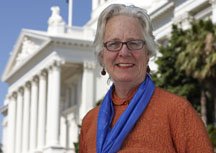Course Distinctions: Leadership in Health Care
Nursing students take lead in leadership

Under the leadership of Chief Patient Care Services Officer and Director of Nursing for UC Davis Medical Center Carol Robinson, UC Davis Medical Center has distinguished itself as one of the best work environments for nurses in the United States.
Leadership development is a core element featured throughout the education and research programs at the Betty Irene Moore School of Nursing at UC Davis, woven into every aspect of the school’s curriculum.
“Our education program is all about active learning, problem solving and partnering with our community—this is what makes the Betty Irene Moore School of Nursing innovative,” says Deborah Ward, the associate dean for academics, charged with collaborating with the Nursing Science and Health-Care Leadership Graduate Group to create this new curriculum. “We teach leadership throughout and our students are already benefitting, as some have already received work promotions.”
Leadership is a primary focus the moment students arrive at the School of Nursing each September. New students participate in a three-day immersion experience to launch their studies. More than an orientation seminar about logistics, immersion week is a soul-searching opportunity for students to closely examine the leaders they want to become and the changes they hope to make in health care, Ward said.
In 2012, Associate Vice Chancellor for Nursing and Founding Dean Heather M. Young taught the core Leadership in Health Care course with Genevieve Chandler, a visiting professor from University of Massachusetts Amherst Department of Nursing. Students learned best practices in leadership such as how to model the way for others, inspire a shared vision, challenge the process and enable others to act.
The course provides students from the School of Nursing and School of Medicine an overview of interprofessional health-care leadership best practices. For more than a decade, nationally recognized researchers and experts have called for interprofessional approaches to address the complex problems of health care to combine multiple perspectives and expertise and together, coordinate care well. The unique focus of this class is the development of leadership skills for team-based care for all health professionals. Graduate students from the School of Medicine and the Public Health and Health Informatics programs participate along with nursing students.
“This course is for all healthcare professionals,” said Daniel Stein, a student in both the medical school and in the Public Health master’s degree program at UC Davis Health. “It is an important step toward embracing the challenges as transformative leaders in health care.”
Students learn to evaluate their skills first. After assessing themselves, the students mentor others and lead projects to enhance these skills at a deeper level. For example, one student worked with consulting faculty member Jann Murray-Garcia to teach part of a new Race and Health Institute at UC Davis Health. Other students developed leadership skills through the organization of a town-hall meeting with health-care leaders and consumers to discuss necessary improvements to the nation’s health-care system.
“This class and everything we learn at the School of Nursing helps us achieve our goal to become future leaders in health care and create innovative solutions,” said Lori Madden, a doctoral alumna in the School of Nursing’s inaugural classes. “We learn to see leadership in ourselves and others around us. Leadership opportunities occur regularly in every aspect of our lives, in big and small ways, but we don’t always recognize them.”

Professor Deborah Ward, leadership course developer, shares the history and rationale behind the course.
For the first Leadership in Health Care class in early 2011, Young and Chandler invited nurse leaders from Sacramento and Yolo counties to mentor students and discuss how they developed leadership roles in their careers. The invited guests represented a variety of nursing leadership roles, including former California Assemblywoman and Yolo County Supervisor Helen M. Thomson and Pat McFarland, chief executive officer at the Association of California Nurse Leaders. Young said the dialogue was beneficial for both the students, who had the opportunity to talk one on one with highly respected leaders in the community, and for the guests, who shared their passion to mentor future leaders and elevate the nursing profession.
Beyond any one course, the students are directed to take initiative as leaders. During the first quarter, students formed special interest groups to bring together other graduate students at UC Davis, including the School of Medicine, as well as Public Health and Health Informatics programs. For example, nursing students studying health informatics formed a group that included medical and public health students to further support their studies and collaborative work outside the classroom. Led by students, the group invites guest speakers and shares information about cutting-edge technology to advance health.
Young regularly promotes nursing leadership and the strength of the nursing profession. In fall 2010, she created the annual Excellence in Leadership Award to acknowledge community leaders for their inspirational work and contributions to the profession. She also launched a lecture series in 2012 to feature nationally recognized nursing leaders and researchers.
“From the bedside to the boardroom, leadership is at the core of nursing,” Young said. “Nurses are essential health care leaders who advance new policies, manage complex health organizations, and discover solutions to the urgent issues in our society. Whether they contribute to a team of care providers, conduct nursing research, or serve as a faculty member, nurses will advance a new paradigm in American health care.”
Contributions to nursing leadership are also emphasized in the recruitment and development of the school’s founding faculty. According to Ward, schools often search for faculty based on areas of specialty. Candidates for faculty positions at the Betty Irene Moore School are asked to demonstrate their commitment to leadership and the vision of the school along with their work in specialty areas.
“Leadership goes beyond units and organizations,” Ward said. “It is the trust community members have in nurses, knowing this profession is dedicated to the public good, to improve health and society.”
Young and Ward said they will continue to ensure leadership is at the forefront of nursing education and research at UC Davis.
“The Betty Irene Moore School of Nursing embraces and advocates for these values of leadership within every initiative and activity as we prepare the nurse leaders of the future in research, teaching, healthcare delivery and policy,” Young said.





